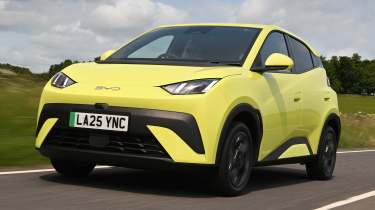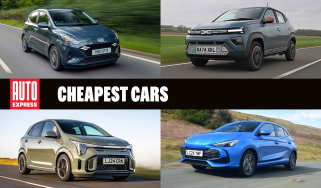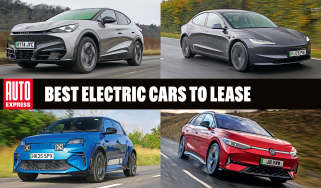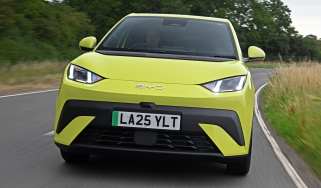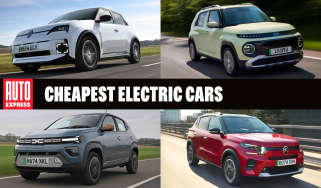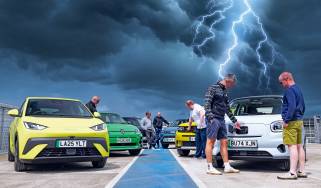BYD Dolphin Surf review
The roomy and compellingly-priced BYD Dolphin Surf is arguably the Chinese brand's most convincing model yet

Our opinion on the BYD Dolphin Surf
The Dolphin Surf is the smallest and most affordable BYD to reach UK shores, and in many ways, it’s the most convincing model in its range. For such a small car, it’s both impressively spacious and comfortable, with strong equipment levels, a good-quality cabin and competitive pricing relative to the recent influx of new European competition. If it wasn't for the likes of the Citroen e-C3 and Renault 5, we’d be singing its praises even more, but those cars feel more sophisticated to drive – particularly in terms of powertrain calibration – and offer better functionality inside, keeping the surprisingly mean-looking little car off the top of the class.
About the BYD Dolphin Surf
This is the BYD Dolphin Surf, the latest marine mammal-named car from the Chinese brand, and its smallest model yet to reach UK shores, below the BYD Dolphin hatchback, BYD Seal saloon and BYD Sealion 7 SUV.
While it may be priced within a few thousand pounds of the dinky Dacia Spring and the Leapmotor T03, the Dolphin Surf is pitched at the slightly larger B-segment of the car market, against the likes of the Renault 5, Citroen e-C3, Hyundai Inster and Fiat Grande Panda.
The Dolphin Surf range consists of three trim levels: Active, Boost and Comfort. Both Active and Boost models utilise an 87bhp electric motor, while the top-of-the-range Comfort comes with a more powerful 154bhp e-motor. To keep the price low, the entry-level Active has a smaller 30kWh battery and is fine for those only doing short urban trips, while Boost and Comfort models have a bigger 43.2kWh battery for those who need a bit more range.
We've tested the Comfort version extensively, having put it through our EV range test against a number of other small electric cars. The Dolphin Surf came second in terms of overall distance covered on a charge in the real world compared to the Hyundai Inster, which has a larger battery. We've also twin-tested the BYD Dolphin Surf against the Hyundai Inster, where it won out over the Hyundai because of its competitive pricing, high equipment level, performance, and interior space.
BYD Dolphin Surf pricing and latest deals
The Dolphin Surf range starts with the Active trim at a little over £18,500, while the mid-range Boost version with the larger capacity battery is just under £22,000. The top-of-the-range Comfort comes in at just shy of £24,000.
If you'd like a BYD Dolphin Surf on your driveway, be sure to make use of our Buy a Car service. You can configure your ideal BYD Dolphin Surf and receive top offers from our dealership network, discover the very best Dolphin Surf leasing deals or browse our selection of used Dolphin Surf models. Need to sell your car? Take a look at our Sell My Car page.
Performance & driving experience
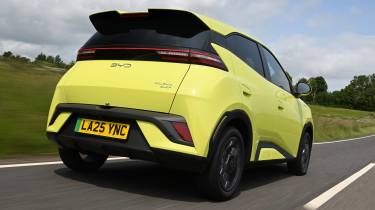
| Pros |
|
| Cons |
|
The Dolphin Surf does its best work around town, but there’s still enough performance and refinement to cover longer trips, too.
Performance, 0-60mph acceleration and top speed
The Active does 0-62mph in 11.1 seconds, but the bigger battery and extra kit of the Boost make it 76kg heavier, so it needs 12.1 seconds to complete the benchmark sprint. The Comfort takes 9.1 seconds, which is a similar time to the 42kWh Fiat 500. All of the Dolphin Surf models have a 93mph top speed.
However, even the top-spec Dolphin Surf with its extra oomph doesn’t leap away from the lights like most people expect an electric car to. We feel that the throttle mapping is rather lazy – even in its most lively sport mode.
The upshot of this is that, when trying to pull out of a junction, not much happens initially, causing you to press a little firmer into the pedal’s travel, at which point the wheels can chirp with a touch of wheelspin, which feels a little uncouth.
On the move, there's only the slightest whine detectable from the electric motor in the Dolphin Surf at low speeds, making it extremely quiet in town driving.
| Model | Power | 0-62mph | Top speed |
| Active | 87bhp | 11.1s | 93mph |
| Boost | 87bhp | 12.1s | 93mph |
| Comfort | 154bhp | 9.1s | 93mph |
Town driving, visibility and parking
Limit the drives to shorter urban trips, and the Dolphin Surf has plenty to recommend it. The compact size – it’s about the same length as a Renault 5 at under four metres – makes it a doddle to drive around town. The Dolphin Surf has a lofty driving position – at 1,590mm tall, it’s slightly higher than the e-C3 – so forward visibility is good, helping you to thread the car through gaps. Trying to see out of the back is less straightforward because the big rear headrests, thick C-pillars eat into your view, and there is a lack of a rear wiper to clean the screen in the rain.
The steering is light, just as you would want in a city car. There are Sport and Comfort settings, with the former adding a bit of extra heft that most drivers will find preferable at higher speeds. The steering isn’t particularly direct, though, and the Dolphin Surf lacks that nimble, darty feel that makes a small car enjoyable to punt about town. However, a turning circle of just 9.9 metres lets the Dolphin Surf perform U-turns where rivals will leave the driver twiddling the wheel during a clumsy three-point turn.
The ride is smooth, and overall refinement is good for a car of this size, if not quite at the level of the very best in the class. The same goes for the handling; we welcome BYD’s decision to fit some decent Hankook tyres in place of the awful Linglong rubber on some of its earlier cars, but even so, the roadholding is merely fine, rather than fun.
Slowing down doesn’t have the slick coordination of some of the Dolphin Surf's rivals. Lift off the throttle, and the regenerative braking – which only has two strengths to choose from – slows the car incredibly gently. Even in the ‘high’ regen mode, it barely feels like you’re not slowing down. It's a shame there isn’t a one-pedal driving mode for the benefit of urban driving, especially for a city-focused car.
Press the brake pedal gently for a little more stopping power, and the transfer between the two doesn’t line up, resulting in a brief moment where the regen releases before the mechanical brakes kick in. It’s by no means alarming, but it is a sensation which is more obvious than with the finely tuned systems in competing models.
B-road driving and handling
The Dolphin Surf corners without too much drama in terms of body lean. When accelerating out of bends, traction is more of an issue, because it’s very easy to spin a wheel – especially with the throttle pedal in the more responsive Sport setting. This is compounded on wet roads, to the point where you question whether the Comfort model's big power output is worthwhile.
At higher speeds, the steering feels both quite sensitive and almost completely lacking in any form of self-centring. As a result, it feels rather odd and doesn't inspire confidence when driving along a twisty road. There’s also more than a hint of torque steer in the powerful Comfort model, where the tyres can struggle for grip under hard acceleration, causing a tugging sensation on the wheel.
The suspension is on the noisy side when called into action over bumps, but it deals with moderately rough surfaces very well, cushioning vibrations and impacts. The ride only becomes jarring over serious potholes, of which there are plenty peppering our roads.
Motorway driving and long-distance comfort
The steering that turns so incredibly tightly at low speeds doesn’t feel as co-operative once the Surf ventures out of town. There’s an odd stickiness to the rack around the straight ahead, which means on fast, straight roads, it feels like the car needs constant micro-corrections to keep it pointing in a straight line. It’s not a concerning issue, but it is rather irritating.
That aside, high-speed refinement is reasonable. The ride remains fairly smooth, and while the Fiat Panda and especially the Renault 5 are more hushed at speed, less wind and road noise reach the Dolphin Surf’s occupants than those sitting inside an Inster.
“Short bursts of acceleration in the mid-range Boost version are OK, like from 20-30mph; however, things tail off extremely quickly after that. That’s fine in a city, but on the open road you’ll wish you upgraded to the more powerful Comfort model.” - Ellis Hyde, news reporter.
Range, charging & running costs
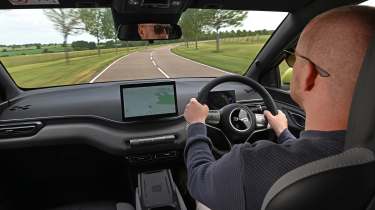
| Pros |
|
| Cons |
|
The Dolphin Surf, in 43.2kWh form, delivers a driving range of up to 200 miles. That's a very strong showing for the city car class, but even the base model can manage close to 137 miles on a full charge in official WLTP tests, fractionally below the Dacia Spring’s 140-mile range.
Despite our small gripes with the powertrain, it is certainly efficient. We first tried the Comfort version in mid-twenties temperatures, which are about as flattering as they get for an EV’s range, but nevertheless, the 5.6 miles/kWh we averaged on a range of roads, although that was more suburban driving than faster motorway work. During our EV range test with a greater mix of motorway driving, the efficiency of the Dolphin Surf dropped to 3.9 miles/kWh, but that's often the case with EVs because there isn't the chance to utilise regenerative braking at a constant speed to put energy back into the battery.
For drivers who plan to use their Dolphin Surf mostly for suburban trips, it's likely that it'll get reasonably close to matching the official range claims in the right conditions.
Electric range, battery life and charge time
The batteries in the Dolphin Surf are lithium-iron phosphate (LFP) units, chosen for their low cost and durability. You get a 30kWh pack with the Active trim, and a 43.2kWh capacity battery with the Boost and Comfort trims.
The maximum charging speed for the smaller battery is 65kW, but the larger-capacity version can charge at 85kW. It means that in either case, the Dolphin Surf can be boosted from 10 per cent to 80 per cent in half an hour. That’s faster than the Dacia Spring (34kW) or Leapmotor T03 (48kW), but the Renault 5 wins out with its 100kW maximum.
Rapid DC charging, of course, should really only be for quick get-me-home top-ups, and all the Dolphin Surf models support 11kW AC charging, which will allow a full charge to 100 per cent in 3.5 hours (Active) or five hours (Boost and Comfort). However, most UK homes only support up to 7.4kW charging, so expect a typical wallbox charger to take five hours to fully recharge the 30kWh version, and seven hours to achieve the same with the 43.2kWh car.
All models also have V2L (Vehicle to Load) capabilities that’ll allow you to plug in an adaptor to the car’s charge port and run various devices. BYD suggests a coffee machine or an electric grill, but we’re not sure how convenient these would actually be in an urban setting, where you’re never more than 20 yards from an outlet.
| Model | Battery size | Range | Insurance group |
| Active | 30kWh | 137 miles | 14A |
| Boost | 43.2kWh | 200 miles | 14A |
| Comfort | 43.2kWh | 193 miles | 19D |
Insurance groups
The BYD Dolphin Surf sits in insurance group 14A if you go for the Active or Boost models, but the more powerful Comfort is in group 19D. For comparison, a Renault 5 starts in group 18, while the Dacia Spring starts in group 24.
Tax
As with all electric cars since April 2025, the BYD Dolphin Surf is liable for vehicle excise duty (VED). This is £195 per year, but at least the little BYD dodges the Expensive Car Supplement for cars costing more than £40,000.
For company car drivers, the BYD slots into the three per cent zero-emissions bracket for the 2025/26 tax year, rising to four per cent in 2026/27 and five per cent in 2027/28.
Depreciation
The Dolphin Surf is expected to maintain around 43 per cent of its original after three years or 36,000 miles, according to our expert data. That's well ahead of the Fiat 500e, which is only anticipated to be worth 31 to 41 per cent of its original value over the same period, but not quite as good as the Renault 5, which is predicted to retain 49 to 51 per cent of its value.
To get an accurate valuation for a specific BYD Dolphin Surf model, check out our free car valuation tool...
Interior, design & technology
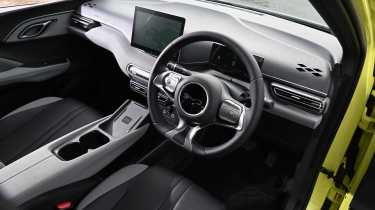
| Pros |
|
| Cons |
|
BYD hasn’t exactly set the car design world alight with any of its products to date, employing a largely safe and inoffensive strategy. The BYD Dolphin Surf doesn’t deviate too far from this, but it has at least got a splash of sporty character about it, with a sizeable roof spoiler, a strong character line down the flanks, and a sharp nose and quadrilateral headlights that have the vaguest hint of Lamborghini about them – make of it what you will, but it’s one of BYD’s less forgettable European efforts so far.
The firm has also taken the commendable decision of offering the car in a bright ‘Lime Green’ paint shade as standard, so the ones you see on the street are likely to stand out that much more. The less said about the fact that ‘Lime Green’ is, in fact, yellow, the better.
Equipment levels are extremely generous throughout the range; a 10.1-inch rotating touchscreen, sat-nav, Apple CarPlay and Android Auto connectivity, a seven-inch digital instrument panel, rear parking sensors, a reversing camera, keyless entry and go, adaptive cruise control and three Isofix mounting points are standard on every model.
In addition to the larger battery, the Boost adds 16-inch alloy wheels, in place of the Active’s 15-inch steel items, an electrically adjustable driver’s seat, electrically folding door mirrors and rain-sensing wipers are thrown in too. Finally, Comfort benefits from a wireless charging pad, 360-degree camera system, heated front seats and rear privacy glass.
Interior and dashboard design
The cabin looks fairly smart and inoffensive, while the quality is good for a city car at this price, but the likes of Hyundai’s Inster, the Renault 5 and MINI Cooper feel a lot more special inside. BYD has added some different textures to certain surfaces, such as the dashboard, but at the end of the day, everything is made from plastic, while rivals use various fabrics and quirky materials for a more inviting feel.
The central touchscreen is the main focus, but a row of shortcut switches below it gives easy access to the driving modes, ventilation system and stereo volume control. We could live without the squelchy sound effect accompanying the car’s shifts from neutral to drive and reverse, though.
Materials and build quality
We already mentioned the Dolphin Surf’s reliance on plastics – ironic given how hard we’re trying to keep the stuff away from marine life – but every model also gets 'vegan leather' seats, and what looks to be soft grey suede across the dashboard, centre console and sections of the door cards, although it’s not really suede, just a thin layer of slightly squidgy material
The rounded air vents are an eye-catching design, but the plastic door pulls feel a little cheap, and there are hard plastics high up on the doors and the dashboard. In the end, it’s hard to be too critical of budget materials in a car at this price point, because the Dolphin Surf feels much higher-quality inside than the likes of the Dacia Spring. It just doesn’t have the same wow-factor you’ll find in a MINI, Renault 5 or Hyundai Inster.
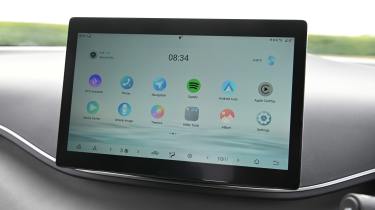
Sat-nav, stereo and infotainment
Every Dolphin gets a 7.2-inch digital driver’s display and a 10.1-inch touchscreen. The latter feature’s BYD’s signature rotating feature, which sees the screen spin 90 degrees to offer both portrait and landscape layouts. In the former, we found that if you’re wearing polarised sunglasses, the information on the screen almost completely disappears, making a slightly gimmicky feature even less useful. Much more handy is the standard Android Auto and Apple CarPlay smartphone connectivity.
BYD has listened to feedback from reviewers and existing owners, leading to fixes of quite a few of our previous criticisms of the infotainment set-up. Where the native system would completely disappear when Android Auto or Apple CarPlay were connected, now the main control bar along the bottom of the touchscreen remains, so it’s still possible to access the menu and make climate control tweaks.
The keys are still small and fiddly to change the temperature, but now a three-finger swipe up or down the screen can adjust that, while a three-finger gesture across can change the fan speed. We found this worked really well in practice, even if the temperature is bizarrely not displayed in degrees like a normal car. There’s still no physical button to demist the back window, and the on-screen key is buried in the climate menu – all the more of a hassle when the Dolphin Surf doesn't have a rear window wiper.
Generally, the touchscreen menus are logically laid out, and the information is presented clearly enough. However, the driver’s display uses a small, thin font, which makes it hard to read the information on display at a glance.
“It’s hard to see BYD’s city car being bought as an urban style statement when it’s up against retro creations like the Renault 5, Fiat 500e and MINI Cooper.” - Steve Walker, head of digital content.
Boot space & practicality
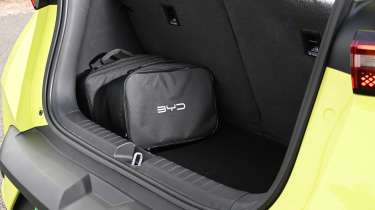
| Pros |
|
| Cons |
|
In a way, the BYD Dolphin Surf straddles two classes, but whether you view it as a big city car or a small supermini, it does a decent job of making the most of the space it’s got.
Dimensions and size
The Dolphin Surf is 3,990mm long and 1,720mm wide, making it substantially bigger than city cars such as the Dacia Spring (3,701mm and 1,583mm) and the Leapmotor T03 (3,620mm and 1,652mm). The Renault 5, another car that treads the size line between the city car and supermini classes, is slightly shorter but wider, at 3,922 and 1,808mm.
| Dimensions comparison | |||
| Model | BYD Dolphin Surf | Leapmotor T03 | Renault 5 |
| Length | 3,990mm | 3,620mm | 3,922mm |
| Width | 1,720mm (1,970 inc mirrors) | 1,652mm | 1,774mm (2,020mm inc mirrors) |
| Height | 1,590mm | 1,577mm | 1,498mm |
| Wheelbase | 2,500mm | 2,400mm | 2,540mm |
| Boot space | 308-1,037 litres | 210 litres | 250-932 litres |
Seats & passenger space
The driving position is helped by a rake adjustable steering wheel, although we'd like more reach adjustment. The sporty-looking front seats are very comfortable and have some side support.
However, a driver with broad shoulders might find the seat back a touch narrow, and we encountered a slight lack of kneeroom because you’re restricted on each side by the centre console and the low door armrest. Headroom in both of the front seats is generous, with a good 5cm of overhead space for six-footers.
Storage space inside is pretty good. All four doors have pockets that can hold a small water bottle, and there's additional space in the centre console – a tray for rear-seat occupants and a large storage area, plus two cupholders for the front. Comfort models also get a wireless phone charging pad, but the surface isn’t grippy, and there’s no lip to stop your device from simply flying out of it if you go around a corner.
For a car this small, the amount of interior space is excellent. Rear knee room is much more generous than the Renault 5, and even has the spacious Citroen e-C3 beaten, although it can't quite match the latter’s excellent headroom. Even so, we’ve had people over six feet tall sit comfortably in the back of the BYD behind their own driving position, with a decent amount of knee room and space for their feet under the seat in front.
The flat floor maximises room in the back, and the padded front seat backs make it more comfortable for your knees to press into them if passengers are especially long limbed. The rear quarters are designed strictly for two, so the Dolphin Surf’s versatility is limited somewhat, but on the plus side, it does mean that shoulder room is great for the people sitting back there.
The rising window line might be a problem for kids in the back seats because the rear window is at chin height for adults, so smaller children will struggle to see out. At least the thin front seat headrests will give them an improved forward view, and there are Isofix child car seat points on the front passenger seat and in the rear. We would like to see some more creature comforts in the back, though, there's not even a solitary USB charger for anyone to charge a phone or tablet.
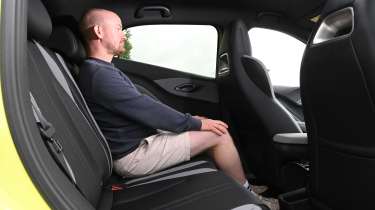
Boot space
The 308-litre boot is large for the class, being equal to the Dacia Spring, and nearly 100 litres more than you get in a Leapmotor T03. The space is quite tall and not very deep, but we reckon you could easily fit a couple of medium-sized suitcases inside if you stood them up on their wheels.
There’s a big loading lip to lift items over, but the opening isn’t too high off the ground to make hoisting your cargo into the boot difficult. There is enough space under the floor for all the charging cable storage, but no ‘frunk’ storage under the Dolphin Surf's bonnet to keep the charging cables separate from your luggage.
The thin rear seats fold down in a 50/50 split to give a large 1,037-litre load space. When they are down, they create a ridge in the load floor, but that’s par for the course in small cars.
"There’s no parcel shelf in the back of the BYD; instead, the rear backrest pretty much meets up with the base of the rear window. This leaves the Dolphin Surf’s boot to make a slightly awkward pyramid shape." – Alex Ingram, chief reviewer
Reliability & safety
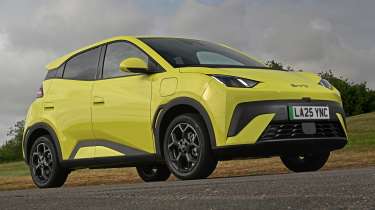
| Pros |
|
| Cons |
|
BYD told us they were confident of getting a four-star Euro NCAP score, but actually gained the highest five-star rating when the car was tested in 2025. That's one star higher than the Hyundai Inster, and the same five-star score as the pricier MINI Cooper.
BYD is very proud that its innovative battery design passes the ‘nail penetration test’ – which you can probably imagine the mechanics of – without its surface temperature exceeding 60 degrees. In practice, it means that if the battery is damaged in an accident, the chance of a fire is very slim.
Safety kit runs to front and side airbags for the front-seat occupants and automatic emergency braking. There’s also a suite of other driver-assistance features, from lane-departure assist to auto-dipping of the headlights. We do have a gripe with the driver monitoring system, which goes off if you simply look slightly to the side as you might do when approaching a corner to see if there's anything coming. It even goes off if you look at the rear view mirror. It's so annoying that you have to turn it off, which rather defeats the point of a system that's supposed to keep you safe.
| Euro NCAP safety ratings | |
| Euro NCAP safety rating | 5 stars out of 5 (2025) |
| Adult occupant protection | 82% |
| Child occupant protection | 86% |
| Vulnerable road user protection | 76% |
| Safety assist | 77% |
Buying and owning
Our Best buy: BYD Dolphin Surf Active
No version of the Dolphin Surf is poorly equipped. You get the same infotainment set-up, including the big 10.1-inch touchscreen, smartphone connectivity, keyless entry and start, adaptive cruise control, parking sensors and vegan leather trim, regardless of which trim level you go for.
If you only plan to use your BYD Dolphin Surf as a city car for short urban trips, go with the Active, because the 137-mile range won’t matter as much, you don’t need much power, and you’ll save some cash. However, if you plan on venturing out of the city limits, even semi-regularly, then we’d recommend upgrading to the Comfort, because it offers a longer 193-mile range and, thanks to its more powerful motor, you won’t feel like you’re going to hold up traffic.
BYD Dolphin Surf alternatives
Small, low-cost electric cars are becoming more commonplace, and the obvious alternatives to the Dolphin Surf for those prioritising low costs are the Dacia Spring and the slightly pricier but also more sophisticated Leapmotor T03.
If you’re happy to pay more for a small car with a bit more style about it, there are many options. The Renault 5, Fiat Grande Panda, Hyundai Inster, Fiat 500e, and even the MINI Cooper Electric are all vying for your attention in this space. The Citroen e-C3 is another candidate, offering a lot of comfort and cabin space for the money.
You also have a dwindling pool of petrol-powered city cars, the best current options being the Hyundai i10 and its Kia Picanto sibling.
Latest deals on the Dolphin Surf and rivals
BYD Dolphin Surf Pictures
Frequently Asked Questions
We managed 3.9 miles per kWh from the BYD Dolphin Surf Comfort during our real-world range test on a mix of UK roads (and weather, as it turned out). That would equate to a real-world range of 168 miles from the 43.2kWh battery.
New & used BYD Dolphin Surf deals
